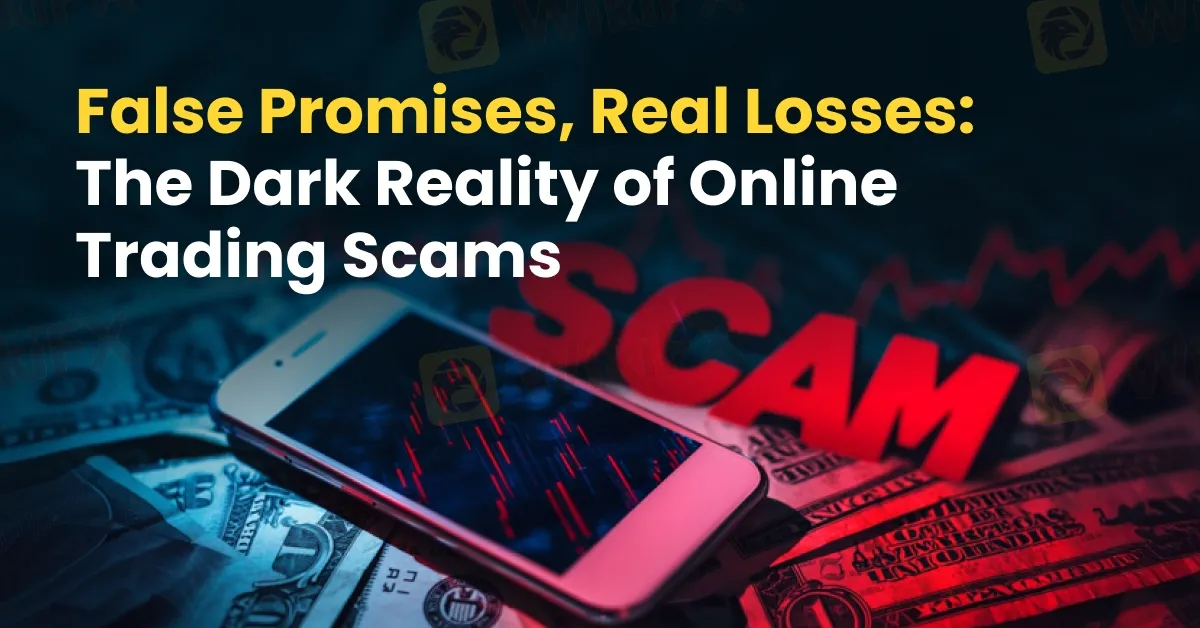简体中文
繁體中文
English
Pусский
日本語
ภาษาไทย
Tiếng Việt
Bahasa Indonesia
Español
हिन्दी
Filippiiniläinen
Français
Deutsch
Português
Türkçe
한국어
العربية
False Promises, Real Losses: The Dark Reality of Online Trading Scams
Abstract:In an era where financial independence is marketed as just a few clicks away, online trading platforms have become fertile ground for a dangerous breed of digital deception with seductive fake promises including quick profits, little effort, and exclusive insights.

In an era where financial independence is marketed as just a few clicks away, online trading platforms have become fertile ground for a dangerous breed of digital deception. For every legitimate brokerage or trading educator, a legion of scammers lurks behind polished websites and persuasive ads, armed with a calculated playbook aimed at exploiting retail traders' hopes, inexperience, and FOMO (fear of missing out).
The promise is seductive: quick profits, little effort, and exclusive insights. But the reality for many retail investors is sobering. Rather than riding a bull market to financial freedom, they find themselves ensnared in a bear trap of manipulation, misdirection, and monetary loss.

Fraudsters frequently pose as trading gurus or representatives of well-known financial institutions. Leveraging doctored certifications, fake LinkedIn profiles, or AI-generated videos, they present a veneer of legitimacy. Phrases like “regulated by top-tier authorities” or “endorsed by global financial bodies” are liberally used without verifiable evidence. For victims, this false sense of security often lowers their guard.

Perhaps the most tell-tale sign is the promise of unrealistic returns. Claims of 20%, 50%, or even 100% profit in days or weeks are common bait. These are often backed by photoshopped account statements or staged testimonials. Initially, small withdrawals are permitted to build trust but once larger sums are deposited, communication ceases, and the traders funds disappear.

Scammers thrive on urgency. Limited-time offers, countdown timers, and exclusive ‘VIP’ opportunities are used to push users into hasty decisions. Victims are told they must “act now” to secure their financial future while simultaneously discouraging due diligence in the process.

Sophisticated schemes go further by creating clone websites or apps that mirror legitimate trading platforms. Victims unknowingly enter personal data or deposit funds into fraudulent accounts, believing they're engaging with trusted services. By the time discrepancies are noticed, the fraudsters have vanished.

A cruel twist in this saga is the follow-up scam. After suffering losses, victims are contacted by so-called “recovery experts” promising to retrieve lost funds, typically for a fee. Desperation often leads victims to fall twice.
While regulation is catching up, vigilance remains a trader's best defence. Investors should verify licences with financial authorities, be sceptical of pressure tactics, and avoid trading through social media channels or messaging apps. Crucially, if it sounds too good to be true, it likely is.
The digital trading revolution has empowered millions. But where there's money, there's malice. As scammers evolve in sophistication, so too must the awareness of retail traders. Education, scepticism, and regulatory enforcement are the only real tools to counter this enduring threat.

As incidents like this become increasingly common, tools such as WikiFX can play a vital role in helping individuals verify the legitimacy of brokers and financial platforms. WikiFX offers an extensive database of global broker profiles, regulatory status updates, and user reviews, enabling users to make informed decisions before committing to any financial investment. Its risk ratings and alerts for unlicensed or suspicious entities help investors easily spot red flags and avoid potential scams. By using tools like WikiFX to research a broker's background, individuals can safeguard their hard-earned savings and reduce the risk of falling victim to fraudulent schemes.

Disclaimer:
The views in this article only represent the author's personal views, and do not constitute investment advice on this platform. This platform does not guarantee the accuracy, completeness and timeliness of the information in the article, and will not be liable for any loss caused by the use of or reliance on the information in the article.
Read more

OctaFX Flagged by Malaysian Authorities
OctaFX has been officially listed on warning lists by both Bank Negara Malaysia (BNM) and the Securities Commission Malaysia (SC). These alerts raise serious concerns about the broker’s status and whether it is legally allowed to operate in Malaysia.

Why Your Worst Enemy in Trading Might Be You
Be Honest With Yourself: Are You Slowly Destroying Your Trading Account?

TradingPRO: A Closer Look at Its Licences
In an industry where safety and transparency are essential, the regulatory status of online brokers has never been more important. For traders seeking to protect their capital, ensuring that a platform operates under recognised and stringent oversight can make all the difference. Keep reading to learn more about TradingPRO and its licenses.

Oil Price Breakout Incoming? Investors Should Stay Alert
Oil prices are hovering around a critical level, with potential yet to be fully unleashed. Investors must prepare for sudden changes.
WikiFX Broker
Latest News
SkyLine Guide 2025 Malaysia: 100 Esteemed Judges Successfully Assembled
Vantage Markets Review 2025: Trusted Forex and CFD Trading Since 2009
Why STARTRADER Is Popular Among Traders?
A Guide to Intraday Forex Trading You Can't Miss Out
CONSOB Blocks Access to 13 Unauthorized Investment Websites
TradingPRO: A Closer Look at Its Licences
The world could be facing another ‘China shock,’ but it comes with a silver-lining
New SEBI Regulations on Intraday Trading
Everything You need to know about Barath Trade
IronFX Broker Review 2025: A Comprehensive Analysis of Trustworthiness and Performance
Currency Calculator


